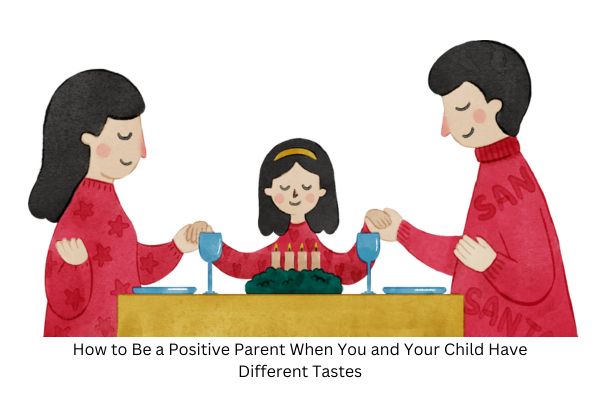Parenting is a journey that can be both rewarding and challenging. One of the most common challenges parents face is navigating their children’s differing tastes, whether it’s about food, hobbies, or interests. It’s natural for parents and children to have different preferences, but this doesn’t mean you can’t be a positive and supportive parent. You can build a stronger parent-child relationship and help your child grow into a well-rounded individual through understanding and respecting these differences. Here, we’ll explore a few ways to be a positive parent when you and your child have different tastes.
Embrace Their Individuality
Recognizing and embracing your child’s individuality is fundamental to fostering a positive and supportive relationship when you have differing tastes. Here’s a more detailed look at how to do this:
- Celebrate Differences: Understand that your child is unique with their likes, dislikes, and preferences. Embrace the idea that these differences are what make them special. Instead of trying to impose your preferences on them, you need to celebrate their distinct identity.
- Avoid Stereotyping: Refrain from categorizing your child based on their tastes. It’s important not to label them as “picky” or “difficult” simply because their preferences differ from your own. Such labels can negatively impact their self-esteem and hinder their personal growth.
- Encourage Exploration: Encouraging your child to explore their interests is crucial. You can provide them with a variety of opportunities to discover their passions. Whether it’s art, sports, or music, allow them to try different activities and find what truthfully resonates with them.
- Respect Autonomy: As your child grows, they need the space to make choices and decisions for themselves. Support their autonomy by allowing them to make age-appropriate decisions, even if those choices differ from your own.
- Positive Reinforcement: When your child expresses their interests and passions, offer positive reinforcement. Praise their efforts and accomplishments, no matter how small. Your encouragement will boost their confidence and motivate them to continue exploring their interests.
Communicate Openly

Effective communication is crucial in understanding and nurturing your child’s unique tastes and preferences. Here’s a more in-depth perspective on fostering open communication:
- Create a Safe Environment: Establish an environment where your child feels safe expressing themselves without fear of judgment or criticism. Let them know that their feelings and opinions are valued.
- Active Listening: When your child shares their interests or concerns, actively listen to them. Show genuine interest in what they’re saying, ask open-ended questions, and seek to understand their perspective.
- Non-Judgmental Attitude: Maintain a non-judgmental attitude when discussing their tastes. Avoid immediately dismissing their choices or criticizing their preferences. Instead, ask for their reasoning and share your thoughts respectfully.
- Regular Check-Ins: Engage in regular check-ins with your child to discuss their evolving tastes and interests. This ongoing dialogue helps you stay connected with their changing preferences.
Find Common Ground
Finding common ground with your child, despite differing tastes, can strengthen your bond. Here’s a closer look at how to achieve this:
- Explore Overlapping Interests: Identify areas of overlap between your interests and those of your child. If both of you have different tastes in movies, find genres that you both enjoy. It could mean exploring family movie nights where everyone gets to pick a film.
- Try New Things Together: Experiment with new activities or hobbies together. It not only fosters a shared experience but also exposes both you and your child to new interests and perspectives.
- Shared Goals: Set common goals that reflect your shared interests. Whether it’s a home gardening project or cooking a new recipe, achieving these goals as a team can be a bonding experience.
- Respect Differences: While it’s essential to find common ground, it’s equally important to respect the areas where your tastes differ. Ensure that your child knows it’s okay to have their unique preferences, and they don’t need to conform to yours.
Be Supportive
Supporting your child’s interests, even when they differ from your own, is vital for their growth and self-esteem. Here’s a more comprehensive look at how to be a supportive parent:
- Offer Resources: If your child is passionate about a particular interest, provide them with the necessary resources and tools. It could mean enrolling them in classes or buying materials to foster their creativity.
- Attend Their Events: Be present at your child’s events, games, or performances related to their interests. Your attendance shows that you value their passions and are there to support them.
- Encourage Practice and Improvement: Help your child set goals related to their interests, and encourage them to practice and improve. Celebrate their progress and acknowledge their efforts.
- Celebrate Achievements: Whether it’s a small achievement like learning a new chord on the guitar or a significant milestone in their chosen interest, celebrate your child’s successes. Acknowledge their hard work and dedication.
Avoid Comparisons

Avoiding comparisons between your child and others is crucial for their self-esteem and emotional well-being. Here’s a more detailed perspective on this:
- Focus on Individual Growth: Shift your focus from comparing your child to siblings, peers, or even your younger self. Instead, concentrate on their individual growth and development. Every child’s journey is unique.
- Celebrate Progress: Celebrate your child’s progress and achievements, no matter how small they may seem. Small victories and improvements are significant steps in their development.
- Set Realistic Goals: Help your child set realistic goals tailored to their capabilities and interests. Encourage them to work towards these goals at their own pace, rather than pushing them to compete with others.
- Offer Encouragement: Encourage your child to be the best version of themselves, not the best compared to others. Reinforce the idea that they are valued for who they are, not for how they measure up to others.
Show Interest
Showing genuine interest in your child’s interests, even if they differ from your own, is a powerful way to connect with them. Here’s how to do it more effectively:
- Ask Open-Ended Questions: Engage your child in conversations about their interests by asking open-ended questions. Encourage them to elaborate on their thoughts, experiences, and motivations.
- Learn Alongside Them: If your child is passionate about a particular hobby or activity, take the opportunity to learn about it with them. Read books, watch documentaries, or participate in related activities together.
- Attend Their Activities: Be present when your child participates in events or activities related to their interests. Your presence demonstrates your support and enthusiasm for what they love.
- Share Experiences: Share your own experiences and interests, and how they relate to your child’s passions. It can open up a dialogue and create opportunities for bonding.
Encourage Exploration
Encouraging your child to explore different interests and experiences is essential for their personal growth. Here’s a deeper look at how to foster this exploration:
- Expose Them to Diversity: Introduce your child to a variety of experiences, cultures, and ideas. It broadens their perspective and encourages them to explore different tastes and interests.
- Provide Opportunities: Offer opportunities for your child to engage in different activities. It could include enrolling them in after-school programs, taking them to museums, or encouraging them to try new hobbies.
- Praise Curiosity: Praise your child’s curiosity and willingness to explore. Encourage them to ask questions, try new things, and take calculated risks.
- Support Their Passions: When your child shows a genuine interest in a new hobby or activity, provide the resources and guidance needed to pursue it. It allows them to delve deeper into their newfound interest.
Teach Tolerance and Open-Mindedness
As a parent, it’s your responsibility to teach your child tolerance and open-mindedness. Explain that differences in taste are natural, and the world is full of diverse perspectives. Encourage them to respect and appreciate the choices of others, even when they differ from their own.
Set Boundaries When Necessary
While it’s crucial to respect your child’s individuality, there may be occasions where setting boundaries is necessary, especially if their choices are potentially harmful or unsafe. Here’s a more detailed approach to setting boundaries:
- Safety First: When it comes to safety concerns, prioritize the well-being of your child. Explain the potential risks and consequences associated with their choices and outline the boundaries necessary to ensure their safety.
- Open Dialogue: Approach boundary-setting as an opportunity for an open dialogue. Encourage your child to express their thoughts and concerns, and be willing to listen and make adjustments when appropriate.
- Consistency: Consistency is essential when enforcing boundaries. Ensure that the rules and consequences you establish are consistently applied. It helps your child understand the importance of these boundaries.
- Explain the “Why”: Provide a clear and reasonable explanation for the boundaries you set. It helps your child understand the purpose behind the rules and reduces resistance.
Final Words
Being a positive parent when you and your child have different tastes requires patience, empathy, and understanding. Embracing your child’s individuality, communicating openly, and supporting their interests are essential to building a healthy parent-child relationship. Remember that it’s not about making your child mirror your preferences but about nurturing their unique personality and helping them grow into a well-rounded and confident individual. By following these tips, you can navigate the challenges of differing tastes with love and positivity.





